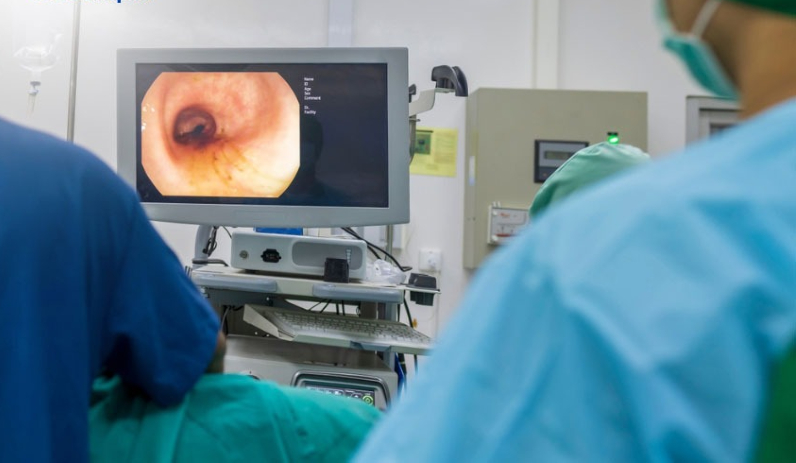According to GLOBOCAN 2022, stomach cancer ranks fifth in terms of incidence and mortality worldwide . Whether stomach cancer is contagious or whether Helicobacter pylori (H. pylori) bacteria is the main culprit remains a question for many people.
Many people still don't know whether stomach cancer is contagious, but the answer from experts is no. To date, cancer in general, and stomach cancer in particular, is almost impossible to transmit from one person to another.
 |
| According to GLOBOCAN 2022, stomach cancer ranks fifth in terms of incidence and mortality worldwide. |
The word "almost" is used because while there is still a possibility of cancer spreading, it is extremely unlikely. Currently, medical literature has documented a few cases and is still monitoring the possibility of cancer spreading due to organ transplantation.
People who receive organ or tissue transplants may develop cancer because the donor previously had cancer. However, this rate is very low, occurring in only about 2 out of 10,000 cases.
Currently, doctors no longer use organs or tissues from people with a history of cancer for organ transplantation. The stomach is also an organ that does not require transplantation, because patients who have had their entire stomach removed can still live – although their quality of life will be affected after surgery.
There is some misconception that leads many people to believe that stomach cancer is contagious. The majority of stomach cancer cases are not hereditary, and there is no family history of cancer.
Other contributing factors include the bacterium Helicobacter pylori, or HP bacteria. The World Health Organization (WHO) classifies H. pylori as a Group 1 carcinogen. This bacterium can cause stomach cancer through the following mechanisms:
Chronic inflammation: When H. pylori bacteria invade the stomach, they attach to the stomach lining and secrete toxins that cause inflammation. Chronic inflammation caused by H. pylori can lead to DNA damage in stomach lining cells, creating conditions for cancer development.
Cell proliferation stimulation: Helicobacter pylori (H. pylori) bacteria stimulate the production of gastric epithelial cells, leading to abnormal growth of these cells. This abnormal cell growth can lead to cancerous tumors.
Immunosuppression: Helicobacter pylori bacteria can suppress the body's immune system, making it more difficult for the body to destroy cancer cells.
Producing carcinogens: Helicobacter pylori bacteria produce several substances that can cause cancer, including nitrates and ammonia.
In addition, H. pylori bacteria can interact with other risk factors for stomach cancer, such as a diet deficient in vitamins and minerals, smoking, and exposure to toxic chemicals.
Many people wonder, "Is stomach cancer contagious if the H. pylori bacteria from someone with stomach cancer is transmitted to another person?"
According to Dr. Nguyen Tien Sy, Department of Oncology, Tam Anh General Hospital, Ho Chi Minh City, Helicobacter pylori (HP) bacteria can be transmitted from person to person through direct contact with the secretions of an infected person, including saliva, gastric fluid, and feces. However, transmission of HP bacteria does not necessarily mean transmission of stomach cancer.
Helicobacter pylori (H. pylori) bacteria are one of the risk factors for stomach cancer, but they are not the only one. The development of stomach cancer requires a combination of factors, including genetics, diet, lifestyle, and environmental factors.
Not everyone infected with H. pylori develops stomach cancer: The risk of stomach cancer due to H. pylori infection depends on several factors, including the strain of bacteria, the duration of infection, and the individual's overall health.
Helicobacter pylori (H. pylori) bacteria need time to cause stomach cancer: The process from H. pylori infection to the development of stomach cancer can take years, even decades.
Therefore, exposure to H. pylori bacteria from someone with stomach cancer does not mean you will develop stomach cancer.
Is stomach cancer contagious if everyone in the family has syndromes that increase the risk of developing cancer? It's possible for more than one person in a family to have stomach cancer, but that doesn't necessarily mean they contracted it from a relative.
Many factors, including genetic conditions, can lead to stomach cancer. These include a family history of stomach cancer, Lynch syndrome, familial adenomatous polyposis (FAP), etc.
Therefore, if several members of the same family happen to have stomach cancer, it is most likely due to genetic reasons and not because of "contagion" from others.
Science has shown that a high-salt diet is linked to stomach cancer. Family members who share similar tastes and consume a lot of salt have a higher risk of developing stomach cancer.
According to the doctor, the only known route of cancer transmission is through organ transplantation. However, the stomach is not a mandatory organ for survival. Therefore, it is very rare for patients to require a transplant of this organ.
There are still some rare cases where patients experience multiple organ failure, requiring simultaneous organ replacements to survive. In these cases, the patient may need a multi-organ transplant including the stomach, intestine, pancreas, liver, and kidney.
Therefore, whether stomach cancer is contagious depends heavily on whether the transplanted organs contain cancerous cells. However, the rate of stomach cancer among patients who receive multiple organ transplants remains very low.
Is stomach cancer hereditary? The answer is yes. However, the incidence of hereditary stomach cancer is quite low. The age of people with hereditary stomach cancer is also much lower than the average age of onset. A Japanese report, based on statistics from over 100,000 people with colorectal cancer, found an average age of around 67.
Meanwhile, those with a genetic predisposition to stomach cancer are often diagnosed before age 40, below the recommended threshold for stomach cancer screening. So, is stomach cancer contagious among family members? The answer remains "no".
Although the incidence of stomach cancer due to genetics is low, people with a family history of stomach cancer are at high risk. Therefore, it is still necessary to proactively undergo regular screenings from a young age to detect and treat cancer in a timely manner.
Currently, the exact cause of stomach cancer is still unclear. The main risk factors directly associated with stomach cancer are the Helicobacter pylori bacteria and dietary habits. However, many other factors are related to or influence a person's risk of developing stomach cancer.
Here are some factors associated with an increased risk of stomach cancer:
Bacteria: In 1994, the World Health Organization recognized Helicobacter pylori as the leading cause of increased risk of stomach cancer.
Genetics: People with a family history of stomach cancer have a higher risk of developing stomach cancer. Several syndromes can cause stomach cancer, including: hereditary diffuse gastric cancer (HDGC), hereditary breast and ovarian cancer (HBOC), Lynch syndrome, and familial adenomatous polyposis (FAP).
Gender: The rate of stomach cancer in men is twice as high as in women (according to GLOBOCAN 2022 data).
Age: People with stomach cancer are typically 55 years of age or older, mostly in their 60s or 70s.
Ethnicity: Stomach cancer is less common in white people than in black people, Asians, and Hispanics.
Diet: High salt consumption increases the risk of stomach cancer. Foods high in salt are often dried, pickled, smoked, fast food, canned foods, etc.
Surgery: People who have undergone surgery to treat stomach-related conditions have a higher risk of developing stomach cancer.
Stomach diseases: People with conditions such as gastric anemia or insufficient gastric juice have a higher rate of stomach cancer.
Occupation: People whose jobs involve frequent exposure to certain types of toxic fumes and dust may have an increased risk of stomach cancer.
Alcohol and tobacco: People who use alcohol and tobacco heavily have an increased risk of developing stomach cancer.
Obesity: Obesity increases the risk of stomach cancer in men. There are no reports of obesity and stomach cancer in women.
Although the question "Is stomach cancer contagious?" has been answered, how can we reduce the incidence of stomach cancer? Based on risk factors, people can reduce their risk of stomach cancer by:
Avoid smoking and limit alcohol consumption. Eat a healthy diet, limiting salt and processed foods. Always monitor your weight and avoid being overweight or obese.
Individuals in high-risk groups should undergo regular stomach cancer screenings every 3-5 years to prevent the disease and ensure timely treatment. Stomach cancer in its early stages is almost always asymptomatic.
Without screening, it is very difficult to detect stomach cancer early. Early detection of stomach cancer is a crucial factor affecting the survival rate of patients. So what does stomach cancer screening include and how is it performed?
Not everyone needs to be screened for stomach cancer. Those at high risk for stomach cancer include: People with a family history of stomach cancer: If your parents, siblings, or children have had stomach cancer, you are at a higher risk of developing the disease.
People infected with H. pylori: H. pylori bacteria are a leading cause of increased risk of stomach cancer.
People with unhealthy diets: Diets high in salt, red meat, and processed foods can increase the risk of stomach cancer.
Smokers: Smoking increases the risk of many types of cancer, including stomach cancer.
Overweight and obese individuals: Being overweight or obese increases the risk of stomach cancer.
If you have any of the risk factors mentioned above, you should see a doctor for advice on stomach cancer screening. Your doctor will help you determine if you need screening and advise you on the most appropriate screening method.
Diagnostic methods that can be used in gastric cancer screening include gastroscopy. This is the most common and effective method for identifying gastric cancer. Gastroscopy can be combined with biopsy or blood tests to confirm accuracy.
Biopsy: During a gastroscopy, the doctor takes a sample of the suspected lesion in the stomach for testing. The biopsy results will provide the most accurate diagnosis of whether the stomach lesion is benign or malignant.
Contrast X-ray: Patients are given a contrast agent (barium) to take before the scan, which highlights lesions in the stomach on the image. However, this is not a common method for screening for stomach cancer in Vietnam.
Source: https://baodautu.vn/ung-thu-da-day-co-lay-khong-d222543.html




![[Photo] General Secretary To Lam attends the opening session of the Peace Council on Gaza.](https://vphoto.vietnam.vn/thumb/1200x675/vietnam/resource/IMAGE/2026/02/19/1771516865192_tbttolam5-jpg.webp)






































































































Comment (0)